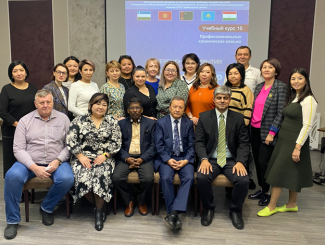UNODC Trains Team of National Trainers from Central Asia on UTC 16 and UTC 19

The UNODC Regional Office for Central Asia supported a training of trainers (ToT) on “Course 16 – Advanced Clinical Skills “ and “Course 19 – “Enhancing Group Facilitation Skills” which took place in person in Almaty, Kazakhstan on 24-29 October 2022. These courses are part of the Advanced Level of the Universal Treatment Curriculum for Substance Use Disorders (UTC training package).
“The COVID-19 pandemic has impacted the persons living with substance use disorders adversely. To begin with the availability and access to the appropriate services for substance use disorders was limited. The pandemic worsened the situation as treatment accessibility became even more challenging. In addition, the pandemic adversely impacted the training and learning opportunities for the addiction professionals. Movement restrictions in response to the pandemic meant that the addiction professionals were left with limited opportunities to learn the skills necessary to offer the appropriate interventions to the persons living with substance use disorders and their care givers. Given the current context, the training organized by the UNODC Regional Office for Central Asia is of great value. The training is targeted at the regional and national trainers. The training is not only expected to benefit the participants directly, but also other addiction professionals across Central Asia, once these regional and national trainers engage in echo trainings” said Mr. Borikhan Shaumarov, Senior Programme Officer of UNODC ROCA during ceremonial welcome.
The sixteen (16) members of the national team of trainers from Kyrgyzstan and Kazakhstan attended the training, delivered by the team of UTC Global Master Trainers.
The first training course was aimed at providing an in-depth understanding of the major counselling approaches and specific theories, as well as an overview of the application of the specific counselling theories in substance use treatment.

The second training course provided an overview of the basic theory of group facilitations and skills on how to begin, conduct and end group work, how to work with group dynamics in treatment settings, ways to work with populations with special clinical needs, guidance for ethical conduct, proper documentation and supervision of group facilitations.

“This training impressed me with the in-depth knowledge it provided. The presentation of the materials is given in an easy form, it shows the nature of human thinking and almost completely reveals the principle, the basis that is necessary for the formation of long-term relationships with the client at all stages of work. It also allows to see from the outside, without prejudice, the client's reaction to patterns that are still now used in many drug treatment clinics. Participation in this training encouraged me to take a fresh look at work strategies in group and individual work as well as rethink past experience, laying the foundation for reaching a higher level of work with clients. Thanks to the training, I found mistakes in my activity, which I have already begun to work on. I also immediately started planning the upcoming echo training, taking into account the knowledge gained” said Ms. Irina Yussupova. Psychologist of Institute of Psychodrama and Psychological Counseling and Rehabilitation Center "Renaissance", Karaganda. Kazakhstan .
The training was conducted within the framework of UNODC global project GLOJ71 “Treating drug dependence and its health consequences: Treatnet” in collaboration with Sub-programme 3: Addressing drug problems, increasing treatment of drug use disorders and preventing HIV/AIDS” of the UNODC Programme for Central Asia for 2022-2025 and Prevention, Treatment and Rehabilitation Section, UNODC HQ with financial support from U.S. Department of State’s Bureau of International Narcotics and Law Enforcement Affairs.